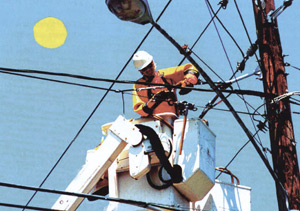Search News
For the Media
For media inquiries, call CWA Communications at 202-434-1168 or email comms@cwa-union.org. To read about CWA Members, Leadership or Industries, visit our About page.
Also in Spring 2012
- A day of stress and a long drive home
- Notice Regarding Union Security Agreements and Agency Fee Objections
- Safe-Patient-Handling Program Reduces Workers' Injuries
- In New Mexico, Patient Control is Challenge for Mental Health Workers
- "Prevention 360" Targets Workplace Injuries in Manufacturing
- Only in the Aircraft Cabin Can a "Workday" Equal 16 Hours
- Media Workers Put Their Safety on the Line
- Violence in the Workplace, New Manual
- Protecting AT&T Technicians from Street Violence
- Cal OSHA Report Contradicts UCLA on Lab Incident
- Working Together: Our Work Environment and How We Change It
- First-ever Criminal Charges Proceeding in UCLA Lab Fire
- Electrical Hazards: An Everyday Danger for Telecom Technicians
- For N.J. Child Protective Services Workers, Violence Comes with the Job
- Strong New Workplace Violence Language At Kaleida Healthcare
Heat Stress, a Burning Issue for Outside Telecom Techs
 CWA is leading a heat stress campaign to provide workers with important information and make sure that employers are following state and federal law. |
Last September, Brent Robinson, a Verizon field technician, started feeling sick while installing phone service at a customer's house in Cucamonga, Calif. Working outdoors in 100-105 degree heat, the Local 9588 member called his supervisor and asked to be released to go home. That request was denied, and Robinson continued with the installation.
On route to his next job, Robinson stopped at a grocery store for a cool drink. Feeling worse, he called 911. By the time the ambulance arrived, the tech was unconscious. Medical personnel performed emergency care and he was rushed to the hospital, but it was too late. Robinson, aged 55, died.
His death is tragic. The even greater tragedy is that Robinson’s death and other heat stress fatalities are preventable. They should never happen. The warning signs and conditions that can lead to heat stress are recognizable. Since 2010, CWA has been leading a Heat Stress Campaign to educate telecommunications workers about heat stress: how to prevent it, how to identify it and how to ensure the employer is in compliance with state and federal standards and guidelines.
Since last year, more than 500 local safety and health activists have attended training classes in Districts 2-13, 4, 6, 7 and 9. Activists are taking what they learn back to their locals and training co-workers about the issue that affects so many outside technicians.
In a CWA heat stress survey conducted in 2010, two-thirds of the more than 1,000 respondents, technicians at CenturyLink, AT&T and Verizon, said they had experienced extreme discomfort from heat while performing their jobs. Three-quarters said their employers had not provided adequate training for working in high heat conditions. Eighty-five percent said employers had not issued work procedures or proper equipment.
“Employers that send workers out in very high temperatures should stress the importance of taking cool-down breaks instead of complaining about how long workers are running the air conditioning in the company truck,” said Local 9588 safety and health chair Robert Harris. Under CalOSHA regulations, employees working in extreme heat conditions are entitled to a 10-minute break whenever necessary, or hourly.
“Brent Robinson probably would be alive today had the company listened to his request to be allowed to go home,” said Harris. The local filed a grievance with Verizon over the technician’s death as well as a complaint with CalOSHA.